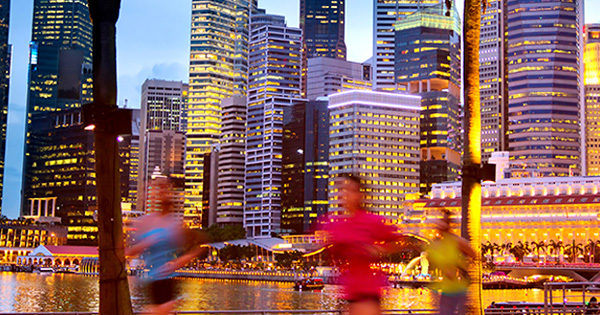Before you fly:
1. Jet lag is not just tiredness
Yes, a long flight can leave you tired and dehydrated, but that’s relatively easy to get over. Jet lag is what happens when your body’s internal clock (known as the Circadian rhythm) is out of alignment with local time, and it can take much longer to correct. Smart travelers start preparing a few days before by moving their schedule closer to that of their destination. Obviously if you’re crossing 12 time zones you can’t start staying up until 8am then sleeping in the day, but you can shift your routine by a few hours to reduce the shock.
2. Be sensible
On paper, staying up late before you travel so you’re more tired and therefore likely to sleep on the plane seems like a good idea. In practice, it rarely works and you’re just as likely to make yourself more tired than necessary if you can’t sleep on the plane. The best way to travel is when you’re well rested.
3. Stop eating
We can’t vouch for this one, but some travelers swear by fasting as a means to combat jetlag. Work out what time you will be eating breakfast at the new destination, count back 16 hours and stop eating at that point. The logic is that the body’s internal clock is driven in part by eating, so skipping meals helps you reset it. Of course, it also means you’re likely be hungry and grumpy on the flight, so this method might not be for everyone.
On the plane:
4. Watch what you drink
While it might be tempting to turn to the drinks trolley to help you relax, alcohol can be dehydrating. Given that the air on planes tends to be very dry anyway, that’s the last thing you need, since dehydration will exacerbate jet lag and make you feel worse. Drink water instead.
5. Eat the right foods
There’s evidence to suggest that eating a meal high in carbohydrates gets the body ready for sleep, while protein has the opposite effect. If you’re heading east then stocking up on carbs on the plane might help you get to sleep at the other end. Conversely is you’re heading west and need to stay awake for a long day, it may be wise to go easy on the airline bread rolls.
6. Keep active on the plane
It’s difficult to move in such a small space and you should be considerate to other passengers (no push-ups in the aisle then) but getting some exercise every hour or so not only helps keep you fresh, it can help prevent dangerous blood clots from forming. Most airlines carry exercise tips in their inflight magazines, so test out the stretches to help beat jetlag.
At your destination:
7. Manage your sleep
When you finally get into your hotel room it can be tempting to go straight to bed, but check the time first. If it’s past 1pm you’re better off keeping active for the rest of the day and then getting an early night. If it’s earlier than 1pm then a few hours’ sleep may be a good idea, but you need to be strict about forcing yourself out of bed. As tempting as it may be to let that two-hour nap become a full eight-hour sleep, you’ll regret it in the long run. The sooner you can align your sleep patterns with local time, the better.
8. Lay off the caffeine
There’s nothing wrong with a coffee or two to help you get through the day, but pay attention to the time so you can be sure it will have left your system before you try to sleep. A double espresso at 6pm is not the best idea if you’re planning on having an early night.
9. Jet lag hates fresh air
Get out, explore the city and get some exercise. You may not quite feel energetic enough to run a marathon, but some light activity will keep you going, plus it ensures that the first day at your destination is not wasted.

10. And finally…
On a short trip? Then don’t even try to acclimatize. If you can get away with eating and sleeping at your ‘home time’ then you can simply carry on as if you’re not in a new time zone. This can be a fun way to see a different side to a city if you’re taking your breakfast in the afternoon and exploring when most people are in bed, but it does require a flexible schedule, so it’s probably not recommended for business trips.
Tips: Smart travelers are also savvier travelers as they are better prepared for their trips. Check out better protection as you travel further.
